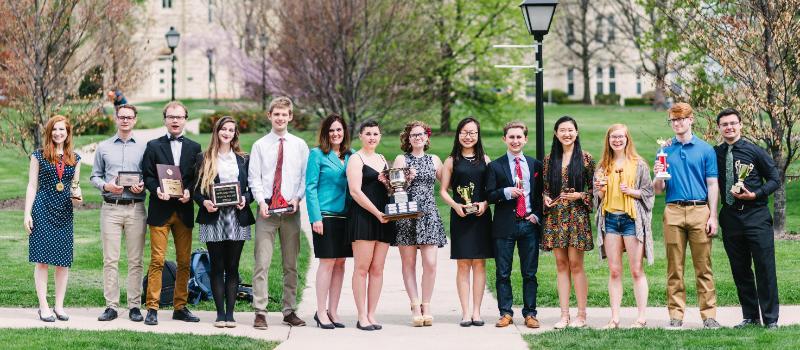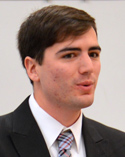
Who We Are
Wheaton Debate is a locally, regionally, and nationally competitive team, known for excellence and well-respected within the debate community. Our focus is formal training in argumentation and debate theory, critical thinking, persuasion, delivery skills, research skills, current events, and various interdisciplinary topics. Students participate in local, regional, and national tournaments alongside the weekly practice rounds.
Though Wheaton has a long history of success in debate, our ultimate goal is to encourage and equip one another to speak with confidence, to win and lose gracefully, and to foster an understanding of and respect for those with opposing viewpoints as people created in God’s image.
“Wheaton Debate has been responsive and supportive from my first communication with Dr. Sietman, our faculty coach…The team has become increasingly like a surrogate family as I transitioned from high school to living and learning at Wheaton College.” - Jordan Embree
Wheaton Debate's Mission Statement
Our goal is to enable students to think critically, speak articulately, argue effectively, and develop skills in communication, argumentation and logic all for the glory of Christ.
“If I speak in the tongues of men or of angels, but do not have love, I am only a resounding gong or a clanging cymbal…” (1 Corinthians 13:1)
Key Information About Debate at Wheaton
Thank you for your interest in Wheaton College’s top-ranked debate program! The following information answers just a few of the commonly-asked questions about debate at Wheaton.
Parliamentary Debate*
A focus on extemporaneous debate:
- a new topic every round
- only 15 minutes to prepare
- no published materials allowed during the debate
A focus on informed debate:
- requires knowledge of current events
- emphasizes broad understanding of a wide variety of topics
- reinforces liberal arts education
*At Wheaton, we compete in British parliamentary debate (USUDA, WUDC).
Two Debate Tracks
Non-Travel Squad
Participants focus on being competitive at mostly local and some regional tournaments. Goals for non-travel debaters include developing strong argumentation skills, becoming highly persuasive speakers, learning the basics of parliamentary debate, and developing strong research skills.
Travel Squad
Participants focus on being locally and regionally competitive in American parliamentary debate while also traveling outside our region to compete in the BP (British parliamentary) format, including USU nationals and the WUDC (World Universities Debating Championship). Goals for travel debaters include honing strong argumentation and rhetorical skills and adapting their persuasive appeals to a very broad audience.
Time Commitment
Being a part of Wheaton Debate requires a significant time commitment:
- Weekly team workshops on Tuesdays from 3:45 pm – 5:30 pm
- Debate practice rounds on Wednesdays from 5:30 pm – 6:30 pm
- Writing debate research briefs
- Staying informed about current events
- Competing at weekend tournaments
While participating in debate takes a serious commitment, it is not all-consuming. Most team members are involved in other campus activities or ministries; many have part-time jobs or internships; and many students on the team are double majors.
Criteria for Participation
- Attend at least 2 tournaments per semester
- Submit at least 3 research assignments per semester
- Attend weekly debate workshops and practice rounds
Costs
Wheaton Debate has a budget that is used to cover travel and tournament expenses. Cost should not be a barrier for anyone to join.
How Partners are Chosen
Undergraduates debate two-on-two against students from other schools. Team pairings are created by mutual agreement between student members and the coaching staff. The mutual request of two students to debate with one another is given substantial consideration. We consider three criteria when forming debate partnerships: complementary strengths and weaknesses, similar experience and commitment levels, and personal compatibility between pairs of students.
How to Join
Students on the debate team enroll in COMM 393 (Intercollegiate Debate). It goes on their academic transcript, but the college does not charge students for the credit. Students can receive up to 1 credit per academic year (thus maximum of 4 credits total if they compete each year). Two years of Comm 393 meets the college requirement for oral competency.
The Rewards
Debate is an activity where students learn to think critically, to be excellent communicators, to develop skills in team-work and leadership, and to argue effectively. Debate is one of the most sought-after experiences on a resume, and the activity is valued even more when you compete for a nationally-recognized team. Wheaton has a long history of success in debate—you will find some very well-known debate alums in our trophy case in the Communication Department on the 2nd floor of the BGC.
Ministry
As a team, we represent Christ within the debate community. Those who do not know Him are watching us—observing how we interact with one another and with those around us, considering what ethical standards we uphold in a debate round, noticing how we react when we win or lose. Ultimately, others watch us to see how consistently we live out our faith. We have an incredible opportunity and a tremendous responsibility to share God’s love and to communicate the hope that we have within us as we interact with students and coaches from other institutions.
For answers to specific questions…
please contact Dr. Rebecca Sietman, Director of Forensics, via email: rebecca.sietman@wheaton.edu
 “Debating has honestly been one of the most formative experiences of my college years. I've made close friends, met people from all over the country, and learned so much about a broad variety of topics…Debate is one of the best ways to learn how to think critically about arguments and to both listen and speak well about almost anything. I can't imagine my college life without it.”
“Debating has honestly been one of the most formative experiences of my college years. I've made close friends, met people from all over the country, and learned so much about a broad variety of topics…Debate is one of the best ways to learn how to think critically about arguments and to both listen and speak well about almost anything. I can't imagine my college life without it.”
- Doug Addleman, Class of 2015